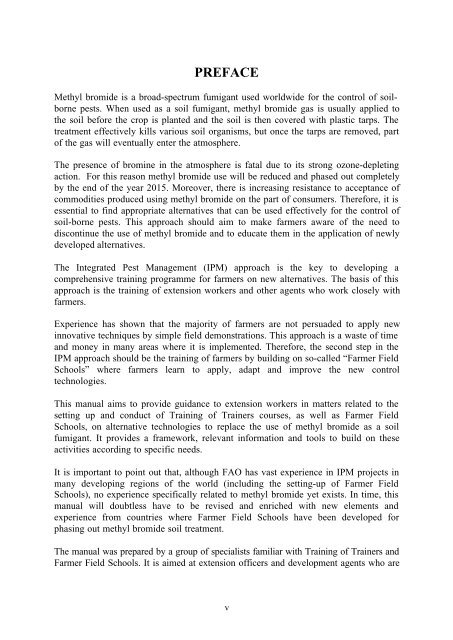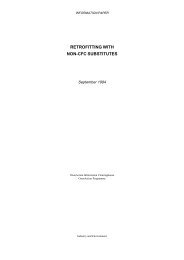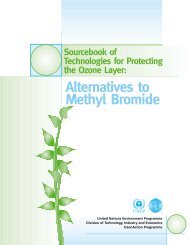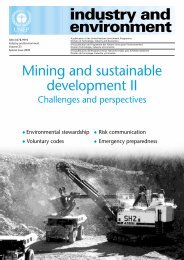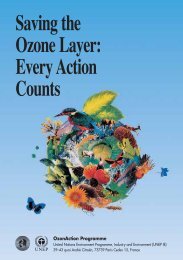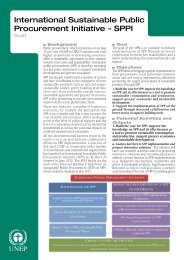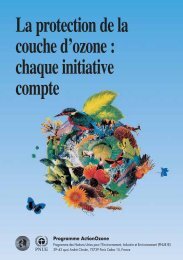Manual for Training of Extension Workers and Farmers on ... - DTIE
Manual for Training of Extension Workers and Farmers on ... - DTIE
Manual for Training of Extension Workers and Farmers on ... - DTIE
You also want an ePaper? Increase the reach of your titles
YUMPU automatically turns print PDFs into web optimized ePapers that Google loves.
PREFACE<br />
Methyl bromide is a broad-spectrum fumigant used worldwide <str<strong>on</strong>g>for</str<strong>on</strong>g> the c<strong>on</strong>trol <str<strong>on</strong>g>of</str<strong>on</strong>g> soilborne<br />
pests. When used as a soil fumigant, methyl bromide gas is usually applied to<br />
the soil be<str<strong>on</strong>g>for</str<strong>on</strong>g>e the crop is planted <str<strong>on</strong>g>and</str<strong>on</strong>g> the soil is then covered with plastic tarps. The<br />
treatment effectively kills various soil organisms, but <strong>on</strong>ce the tarps are removed, part<br />
<str<strong>on</strong>g>of</str<strong>on</strong>g> the gas will eventually enter the atmosphere.<br />
The presence <str<strong>on</strong>g>of</str<strong>on</strong>g> bromine in the atmosphere is fatal due to its str<strong>on</strong>g oz<strong>on</strong>e-depleting<br />
acti<strong>on</strong>. For this reas<strong>on</strong> methyl bromide use will be reduced <str<strong>on</strong>g>and</str<strong>on</strong>g> phased out completely<br />
by the end <str<strong>on</strong>g>of</str<strong>on</strong>g> the year 2015. Moreover, there is increasing resistance to acceptance <str<strong>on</strong>g>of</str<strong>on</strong>g><br />
commodities produced using methyl bromide <strong>on</strong> the part <str<strong>on</strong>g>of</str<strong>on</strong>g> c<strong>on</strong>sumers. There<str<strong>on</strong>g>for</str<strong>on</strong>g>e, it is<br />
essential to find appropriate alternatives that can be used effectively <str<strong>on</strong>g>for</str<strong>on</strong>g> the c<strong>on</strong>trol <str<strong>on</strong>g>of</str<strong>on</strong>g><br />
soil-borne pests. This approach should aim to make farmers aware <str<strong>on</strong>g>of</str<strong>on</strong>g> the need to<br />
disc<strong>on</strong>tinue the use <str<strong>on</strong>g>of</str<strong>on</strong>g> methyl bromide <str<strong>on</strong>g>and</str<strong>on</strong>g> to educate them in the applicati<strong>on</strong> <str<strong>on</strong>g>of</str<strong>on</strong>g> newly<br />
developed alternatives.<br />
The Integrated Pest Management (IPM) approach is the key to developing a<br />
comprehensive training programme <str<strong>on</strong>g>for</str<strong>on</strong>g> farmers <strong>on</strong> new alternatives. The basis <str<strong>on</strong>g>of</str<strong>on</strong>g> this<br />
approach is the training <str<strong>on</strong>g>of</str<strong>on</strong>g> extensi<strong>on</strong> workers <str<strong>on</strong>g>and</str<strong>on</strong>g> other agents who work closely with<br />
farmers.<br />
Experience has shown that the majority <str<strong>on</strong>g>of</str<strong>on</strong>g> farmers are not persuaded to apply new<br />
innovative techniques by simple field dem<strong>on</strong>strati<strong>on</strong>s. This approach is a waste <str<strong>on</strong>g>of</str<strong>on</strong>g> time<br />
<str<strong>on</strong>g>and</str<strong>on</strong>g> m<strong>on</strong>ey in many areas where it is implemented. There<str<strong>on</strong>g>for</str<strong>on</strong>g>e, the sec<strong>on</strong>d step in the<br />
IPM approach should be the training <str<strong>on</strong>g>of</str<strong>on</strong>g> farmers by building <strong>on</strong> so-called “Farmer Field<br />
Schools” where farmers learn to apply, adapt <str<strong>on</strong>g>and</str<strong>on</strong>g> improve the new c<strong>on</strong>trol<br />
technologies.<br />
This manual aims to provide guidance to extensi<strong>on</strong> workers in matters related to the<br />
setting up <str<strong>on</strong>g>and</str<strong>on</strong>g> c<strong>on</strong>duct <str<strong>on</strong>g>of</str<strong>on</strong>g> <str<strong>on</strong>g>Training</str<strong>on</strong>g> <str<strong>on</strong>g>of</str<strong>on</strong>g> Trainers courses, as well as Farmer Field<br />
Schools, <strong>on</strong> alternative technologies to replace the use <str<strong>on</strong>g>of</str<strong>on</strong>g> methyl bromide as a soil<br />
fumigant. It provides a framework, relevant in<str<strong>on</strong>g>for</str<strong>on</strong>g>mati<strong>on</strong> <str<strong>on</strong>g>and</str<strong>on</strong>g> tools to build <strong>on</strong> these<br />
activities according to specific needs.<br />
It is important to point out that, although FAO has vast experience in IPM projects in<br />
many developing regi<strong>on</strong>s <str<strong>on</strong>g>of</str<strong>on</strong>g> the world (including the setting-up <str<strong>on</strong>g>of</str<strong>on</strong>g> Farmer Field<br />
Schools), no experience specifically related to methyl bromide yet exists. In time, this<br />
manual will doubtless have to be revised <str<strong>on</strong>g>and</str<strong>on</strong>g> enriched with new elements <str<strong>on</strong>g>and</str<strong>on</strong>g><br />
experience from countries where Farmer Field Schools have been developed <str<strong>on</strong>g>for</str<strong>on</strong>g><br />
phasing out methyl bromide soil treatment.<br />
The manual was prepared by a group <str<strong>on</strong>g>of</str<strong>on</strong>g> specialists familiar with <str<strong>on</strong>g>Training</str<strong>on</strong>g> <str<strong>on</strong>g>of</str<strong>on</strong>g> Trainers <str<strong>on</strong>g>and</str<strong>on</strong>g><br />
Farmer Field Schools. It is aimed at extensi<strong>on</strong> <str<strong>on</strong>g>of</str<strong>on</strong>g>ficers <str<strong>on</strong>g>and</str<strong>on</strong>g> development agents who are<br />
v


